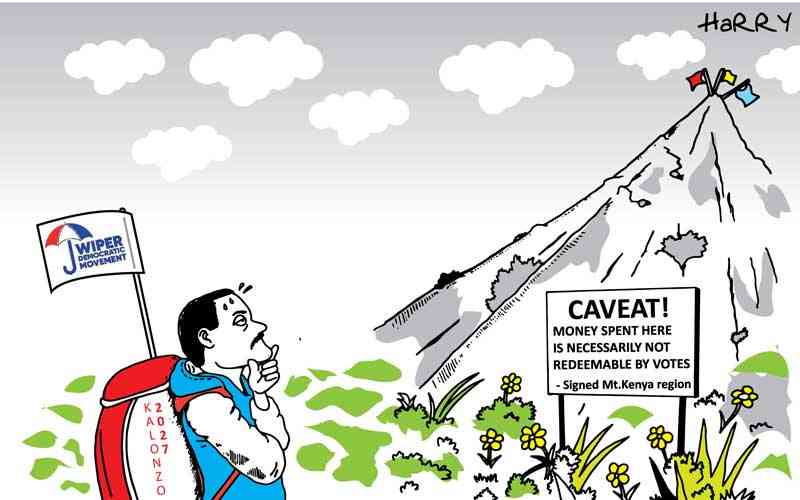Prof Edward Kisiangani calls it the prime narrative. Ngozi Chimamanda Adichie calls it the single story. And social science scholars Daniel Lerner and Everett Rogers called it the dominant paradigm. It all boils down to one thing – intolerance. It is the intemperate belief that there can only be one way of looking at things. There is only one truth and it is a gospel truth. The higher the source of the single story, the more binding it must be to all who hear it.
The single story is always a fanatical narrative. That was why Lerner and Everett called it the dominant paradigm. It seeks to repress all other perspectives while demonising freedom of thought and conscience. Independence of mind descends to thought-crime. George Orwell wrote about the acme of the rule of the dominant narrative in the volume Nineteen-Eighty-Four. In the end, you have a massive sleepwalking population that worships Big Brother, the master of the single story.
Orwell tells us of a downtrodden community of Big Brother’s worshippers. They were “swallowers of slogans, amateur spies and nosers-outers for unorthodoxy.” They are the big man’s civilian army. In Orwell’s world, they will hand you over to the authorities to be vaporised. In our times, they will run you out of town with invective. The master narrative allows no debate, no conscience. In the place of these there is only insolence and diatribe. It is all meant to stifle the birth of a new free world.
The culture of the prime narrative defines the political reality in Kenya today. As is the case in every dystopia ruled by single narratives, there is an unhealthy political duality. Each duality demonises the other. Hence, in Nineteen-Eighty-Four, Big Brother, his party and thought police focus the public’s attention on Immanuel Goldstein, their nemesis. We are told of Goldstein, “He was an object of hatred... He was the commander of a vast shadowy army, an underground network of conspirators dedicated to the overthrow of the State. The Brotherhood, its name was supposed to be. There were also whispered stories of a terrible book, a compendium of all the heresies, of which Goldstein was the author . . .” In short, the outsiders are the devil’s own people.
Are we coming to this pass in Kenya? Can we only see things in the unhealthy duality of the Jubilee Alliance and the Coalition for Reforms and Democracy (CORD)? And is either of them at once paradise and the devil’s kingdom, depending on where you look at it from? If you see it from inside it is paradise. If you are on the outside it is the devil’s kingdom.
I don’t know where Ababu Namwamba is headed, after his fallout with Raila Odinga, whom he at one time glorified. Kenyans will recall the day in February 2008, when Namwamba attempted to digress from the usual parliamentary oath of office. He tried to pledge his loyalty to “my President Raila Amolo Odinga,” to the dismay of many. Now that political amity is on the rocks. Namwamba says he is being sabotaged in ODM. For their part, ODM chiefs say Namwamba has abdicated his responsibility as the Orange party’s Secretary General.
There has been no useful debate after the press conference that Namwamba and several other MPs from his ethnic community held to catalogue their grievances. Perhaps these would have been matters best sorted out within party forums. But they say party organs had long ceased to function. Only they and their nemeses know the truth, one way or the other.
Whatever the case, what should have given ground for debate on how political parties are managed in Kenya has turned into a mutual hate campaign. Namwamba and his team are accused of having “been bought by Jubilee.” In other words, there are only two spaces in Kenya – the Jubilee space and the CORD space. Are we being told that if you leave CORD then you must of necessity exit into Jubilee?
The same intolerance is also in Jubilee, of course. The slightest shade of different opinion from the common narrative will lead you to be demonised. Today their focus is on dissolution of Jubilee member parties and creation of a monolith. Those who question this are demonised. They are considered CORD moles and enemies of the alliance. The country is sitting in a dangerous place if the only possible response to dissenting opinion is demonisation and insolence. The advent of social media has taken this to a new high. Social media is itself a good thing. Like Chairman Mao use to say, “Let a million flowers blossom.”
Citizen journalism on these platforms can be useful in reigning in rogue leadership. Yet most of the time there is no reasoned argument. People are unhappy with what you say purely out of emotions – mostly ethnic based emotions. They don’t, therefore, pause to reflect on the merits of what has been said. They resort to intolerant insults and cheap propaganda. Going forward, Kenyans may need to encourage each other to face issues without the raw anger that comes out of dominant single stories. Free debate and divergence of opinion must be encouraged. This cannot, however, be the same as insolence and character assassination. I have often found myself being enlisted in social media groups whose members excel in trading mutual intolerance, anger and insults. Needless to say, I don’t last beyond a few days in any of these forums.
More fundamentally, this country could be gravitating towards the ultimate Armageddon. We are fast losing the capacity to listen to each other and agree to disagree. We are incubating disastrous intolerance, with political podiums and social media platforms as the breeding and testing grounds. We might just see all this coming to full maturity at the next general poll. The need for preemptive tolerance and peace dialogues that support healthy political plurality cannot be overemphasized. Meanwhile, anyone posting hostile and abusive messages on any of my personal social media platforms – for or against – will be permanently blocked. Debate must be sober and dignified.
 The Standard Group Plc is a
multi-media organization with investments in media platforms spanning newspaper
print operations, television, radio broadcasting, digital and online services. The
Standard Group is recognized as a leading multi-media house in Kenya with a key
influence in matters of national and international interest.
The Standard Group Plc is a
multi-media organization with investments in media platforms spanning newspaper
print operations, television, radio broadcasting, digital and online services. The
Standard Group is recognized as a leading multi-media house in Kenya with a key
influence in matters of national and international interest.
 The Standard Group Plc is a
multi-media organization with investments in media platforms spanning newspaper
print operations, television, radio broadcasting, digital and online services. The
Standard Group is recognized as a leading multi-media house in Kenya with a key
influence in matters of national and international interest.
The Standard Group Plc is a
multi-media organization with investments in media platforms spanning newspaper
print operations, television, radio broadcasting, digital and online services. The
Standard Group is recognized as a leading multi-media house in Kenya with a key
influence in matters of national and international interest.









